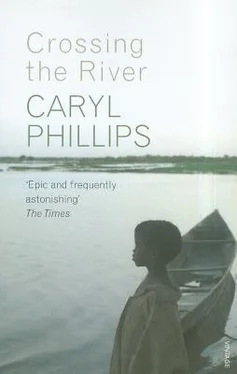Caryl Phillips - Crossing the River
Здесь есть возможность читать онлайн «Caryl Phillips - Crossing the River» весь текст электронной книги совершенно бесплатно (целиком полную версию без сокращений). В некоторых случаях можно слушать аудио, скачать через торрент в формате fb2 и присутствует краткое содержание. Год выпуска: 2006, Издательство: Vintage, Жанр: Современная проза, на английском языке. Описание произведения, (предисловие) а так же отзывы посетителей доступны на портале библиотеки ЛибКат.
- Название:Crossing the River
- Автор:
- Издательство:Vintage
- Жанр:
- Год:2006
- ISBN:нет данных
- Рейтинг книги:4 / 5. Голосов: 1
-
Избранное:Добавить в избранное
- Отзывы:
-
Ваша оценка:
- 80
- 1
- 2
- 3
- 4
- 5
Crossing the River: краткое содержание, описание и аннотация
Предлагаем к чтению аннотацию, описание, краткое содержание или предисловие (зависит от того, что написал сам автор книги «Crossing the River»). Если вы не нашли необходимую информацию о книге — напишите в комментариях, мы постараемся отыскать её.
Crossing the River — читать онлайн бесплатно полную книгу (весь текст) целиком
Ниже представлен текст книги, разбитый по страницам. Система сохранения места последней прочитанной страницы, позволяет с удобством читать онлайн бесплатно книгу «Crossing the River», без необходимости каждый раз заново искать на чём Вы остановились. Поставьте закладку, и сможете в любой момент перейти на страницу, на которой закончили чтение.
Интервал:
Закладка:
Caryl Phillips
Crossing the River
For those who crossed the river
Acknowledgements
I have employed many sources in the preparation of this novel, but would like to express my particular obligation to John Newton’s eighteenth-century Journal of a Slave Trader , which furnished me with invaluable research material for Part III.
Crossing the River
~ ~ ~
A desperate foolishness. The crops failed. I sold my children. I remember. I led them (two boys and a girl) along weary paths, until we reached the place where the mud flats are populated with crabs and gulls. Returned across the bar with the yawl, and prayed a while in the factory chapel . I watched as they huddled together and stared up at the fort, above which flew a foreign flag. Stood beneath the white-washed walls of the factory, waiting for the yawl to return and carry me back over the bar . In the distance stood the ship into whose keep I would soon condemn them. The man and his company were waiting to once again cross the bar. We watched a while. And then approached. Approached by a quiet fellow . Three children only. I jettisoned them at this point, where the tributary stumbles and swims out in all directions to meet the sea. Bought 2 strong man-boys, and a proud girl . I soiled my hands with cold goods in exchange for their warm flesh. A shameful intercourse. I could feel their eyes upon me. Wondering, why ? I turned and journeyed back along the same weary paths. I believe my trade for this voyage has reached its conclusion . And soon after, the chorus of a common memory began to haunt me.
For two hundred and fifty years I have listened to the many-tongued chorus. And occasionally, among the sundry restless voices, I have discovered those of my own children. My Nash. My Martha. My Travis. Their lives fractured. Sinking hopeful roots into difficult soil. For two hundred and fifty years I have longed to tell them: Children, I am your father. I love you. But understand. There are no paths in water. No signposts. There is no return. To a land trampled by the muddy boots of others. To a people encouraged to war among themselves. To a father consumed with guilt. You are beyond. Broken-off, like limbs from a tree. But not lost, for you carry within your bodies the seeds of new trees. Sinking your hopeful roots into difficult soil. And I, who spurned you, can blame only myself for my present misery. For two hundred and fifty years I have waited patiently for the wind to rise on the far bank of the river. For the drum to pound across the water. For the chorus to swell. Only then, if I listen closely, can I rediscover my lost children. A brief, painful communion. A desperate foolishness. The crops failed. I sold my children.
I.THE PAGAN COAST
1
The news reached him after dinner. A well-liveried domestic entered the drawing-room, bowed and thrust forward a silver tray on top of which sat an envelope. Edward seized the letter and dismissed the servant with an elegant flick of his wrist. He levered himself upright and began to read. It was true. Nash Williams, sent to Liberia under the auspices of the American Colonization Society, having undergone a rigorous program of Christian education, and being of sound moral character, had disappeared from the known world. After seven difficult years in Liberia, in which he had worked with unswerving application to his own and his God’s tasks, in which he had apparently won the respect not only of the African natives, but of the free colored men from America, and of the few whites in the inhospitable clime, after seven long years this former bondsman who had been an inspiration to priests and educators alike was nowhere to be found. The worst was feared.
Nash Williams was a teacher of remarkable gifts. He was a man who, in a country in which fewer than two hundred heathens had been converted in almost twenty years, could lay claim to being responsible for at least fifty of the successes that were reported back to America. The reputation of his mission school was legendary, a fact all the more remarkable given the isolated position it occupied near the known head of the St Paul’s River. The few letters he had sent back to his master, whilst full of the usual childish requests for tools, seeds, money and other necessities of life, positively bristled with the spirit of faith, courage and purpose. Then, a little under a year ago, and at the same time as a saddened Edward was mourning the loss of his wife, Nash Williams had conveyed, by means of an intermediary, an abrupt message making it plain that he had no desire ever to hear again from his former master, and informing him that his own communications would now cease. A disturbed and worried Edward, judging it best, at this juncture, not to communicate directly with Nash, had word and money sent by means of a packet out of New York that Madison Williams, an older and somewhat haughty former bondsman, should immediately journey from his place of abode in Monrovia and secure news of Nash’s whereabouts and, if possible, his general state of health. Madison had, at an earlier time, borne Nash some feelings of ill-will, having reasoned, and to some degree correctly, that his master’s affection for himself had been usurped by this younger interloper. But Edward trusted that the passage of time, and a change of climate, would have healed these old wounds, and that Madison would not resent the task with which he was now being entrusted. However, the letter before Edward bore the disturbing news of Madison’s expedition. Not only had Madison failed to locate Nash, but he had been blocked at every turn by native intransigence, their crude vulgarity sometimes taking the form of aggression. The details set forth in Madison’s sad letter let it be known that he considered himself fortunate to have escaped with his life intact.
Not that the American Colonization Society was ignorant of the dangers that would accompany their policy of attempting to repatriate former slaves on the west coast of Africa. This was, after all, a continent belonging to the native African, and to nobody else. But they hoped that the natives would see reason, and that the prospect of welcoming home their lost children might help to overcome any unpleasant cultural estrangement that the African heathens might temporarily experience. The American Colonization Society was sure that benefits would accrue to both nations. America would be removing a cause of increasing social stress, and Africa would be civilized by the return of her descendants, who were now blessed with rational Christian minds. And so on January 31st, 1820, the ship Elizabeth left New York for the west coast of Africa on what was to be the American Colonization Society’s inaugural voyage. Some weeks later, eighty-six former slaves, half of whose number were women and children, arrived unsuccessfully in the British territory of Sierra Leone. Sadly, a mysterious malady, later understood to be malaria, soon dispatched all but a fortunate few of this initial batch of pioneers. Two years later, in 1822, a second and more successful expedition deposited settlers on the Grain Coast, at the part of West Africa that would soon become known as Liberia.
Being chosen for colonization was regarded by most slaves and their masters as reward for faithful service. A skilled worker, who was also a converted Christian with a sound moral base, was considered a prime candidate. But reports from early settlers told stories of great hardships. The initial work of clearing the bush, constructing shelters and building fortifications against native attacks resulted in a heavy toll of life. The wet and miserable climate, which between April and November could produce over two hundred inches of rain, ushered many to an early grave. From December through until March, the poor, unfortunate newcomers, having survived the floods, now labored in unbearably high temperatures, and endured a humidity of stifling proportions. But it was the African fever, or malaria, which most affected the lives of the settlers. The severe chills, producing a sensation of cold as fearful as any American winter, and the accompanying delusions which infected the imagination, combined to introduce a deep misery. No longer were these unfortunate creatures pioneering in the welcoming bosom of their native land, with a clear blue sky for a roof and a fertile soil beneath their dusty feet. They were being tossed upon the stormy seas of fever, and when the storm diminished many found they had been driven clear out of this mortal world.
Читать дальшеИнтервал:
Закладка:
Похожие книги на «Crossing the River»
Представляем Вашему вниманию похожие книги на «Crossing the River» списком для выбора. Мы отобрали схожую по названию и смыслу литературу в надежде предоставить читателям больше вариантов отыскать новые, интересные, ещё непрочитанные произведения.
Обсуждение, отзывы о книге «Crossing the River» и просто собственные мнения читателей. Оставьте ваши комментарии, напишите, что Вы думаете о произведении, его смысле или главных героях. Укажите что конкретно понравилось, а что нет, и почему Вы так считаете.












